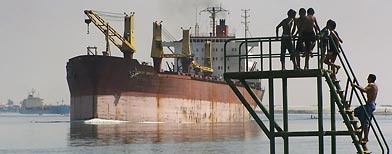CASPER
THE FRIENDLY GHOST

Unrest in Egypt Unsettles Global Markets
NEW YORK — For investors, it is what is known as an exogenous event — a sudden political or economic jolt that cannot be predicted or modeled but sends shockwaves rippling through global markets.
Investors have largely shrugged off several of these unexpected developments recently, including the sovereign debt crisis in Europe, but the situation in Egypt has the potential to cause more widespread uncertainty, especially if oil and other commodities keep surging or the unrest spreads to more countries in the Middle East.
While Egypt’s banks and stock market were closed because of the protests there, other Middle Eastern markets declined in trading Sunday, with shares falling by 4.3 percent in Dubai, 3.7 percent in Abu Dhabi and 2.9 percent in Qatar. The markets rebounded slightly in early Monday trading.
By Monday afternoon, Asian markets were also trending lower, with the Nikkei 225 index in Japan falling 1.2 percent, while the Kospi in Seoul slid 1.8 percent and the Hang Seng in Hong Kong dropped 0.7 percent.
Even though the Asian-Pacific region has little direct exposure to Egypt, the unrest there helped damp investors’ risk appetite, which was already low before the Lunar New Year holiday later this week, analysts at DBS in Singapore wrote in a note.
Last week, the Dow Jones industrial average nearly surpassed the closely watched 12,000 level, but fell 166 points in late trading Friday as the protests in Egypt intensified and oil prices jumped 3.7 percent to $89.34.
With the United States economy seeming to gain a foothold only recently — government data released Friday showed the economy grew by 3.2 percent in the fourth quarter of 2010 — a sustained increase in oil prices could choke growth, analysts said. It could also undermine the more general optimism that lifted the Standard & Poor’s 500-stock index by 1.5 percent in January, after a 12.8 percent jump in 2010.
“A one-dollar, one-day increase in a barrel of oil takes $12 million out of the U.S. economy,” said Jason S. Grumet, president of the Bipartisan Policy Center, a Washington research group. “If tensions in the Mideast cause oil prices to rise by $5 for even just three months, over $5 billion dollars will leave the U.S. economy. Obviously, this is not a strategy for creating new jobs.”
In early electronic trading on the Nymex oil futures market Monday afternoon in Asia, prices edged higher to $89.45 a barrel.
Until now, the stock market in the United States has defied several outside threats, including the rising risk of food inflation, interest rate increases in China, and sovereign debt troubles in Europe, said Sam Stovall, chief investment strategist of Standard & Poor’s Equity Research.
“But as is usually the case, a boxer never gets knocked out by a punch he’s looking for,” he said. “This could be what triggers the decline. Geopolitical events are very, very hard to model.”
Egypt is not an oil exporter, nor is its stock market a regional heavyweight. As the home of the Suez Canal and the nearby Sumed pipeline, however, it is one of a handful of spots classified as World Oil Transit Chokepoints by the Energy Department, and events there can have an outsize impact on global energy prices.
The 141-year-old canal is just 1,000 feet wide at its narrowest, and it cannot handle supertankers, forcing shippers to rely on the pipeline or smaller vessels to move the crude.
